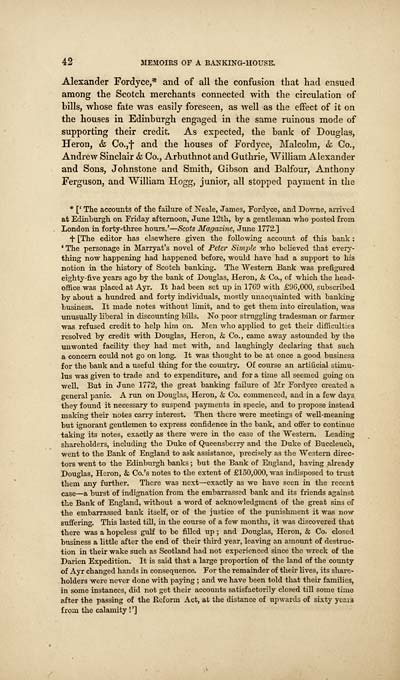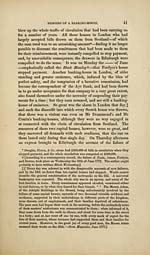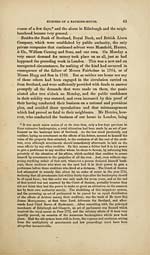Memoirs of a banking house
(60) Page 42
Download files
Complete book:
Individual page:
Thumbnail gallery: Grid view | List view

42 MEMOIRS OF A BANKING-HOUSE.
Alexander Fordyce,* and of all the confusion that had ensued
among the Scotch merchants connected with the circulation of
bills, whose fate was easily foreseen, as well as the effect of it on
the houses in Edinburgh engaged in the same ruinous mode of
supporting their credit. As expected, the bank of Douglas,
Heron, & Co.,f and the houses of Fordyce, Malcolm, & Co.,
Andrew Sinclair & Co., Arbuthnot and Guthiie, William Alexander
and Sons, Johnstone and Smith, Gibson and Balfour, Anthony
Ferguson, and William Hogg, junior, all stopped payment in the
* [' The accounts of the failure of Neale, James, Fordyce, and Dovme, arrived
at Edinburgh on Friday afternoon, June 12th, by a gentleman who posted from
London in forty-three hours.' — Scots Magazine, Jime 1772.]
+ [The editor has elsewhere given the following account of this bank :
'The personage in Marrj'at's novel of Peter Simj'ile who believed that everj--
thing now happening had happened before, would have had a support to his
notion in the history of Scotch banking. The "Western Bank was prefigured
eighty-five years ago by the bank of Doiiglas, Heron, & Co., of which the head-
office was placed at Ayr. It had been set uj) in 1769 with £96,000, subscribed
by about a hundred and forty individuals, mostly unacquainted with banking
business. It made notes ■without limit, and to get them into circulation, was
unusually liberal in discounting bills. No poor struggling tradesman or farmer
was refused credit to help him on. Men who a^jplied to get their difficulties
resolved by credit with Douglas, Heron, & Co., came away astounded by the
unwonted facUity they had met with, and laughingly declaring that such
a concern could not go on long. It was thought to be at once a good business
for the bank and a ixsef ul thing for the comitrj'. Of course an artificial stimu-
lus was given to trade and to expenditure, and for a time aU seemed going on
well. But in June 1772, the great banking failure of Mr Fordyce created a
general panic. A run on Douglas, Heron, & Co. commenced, and in a few daj^s
they found it necessary to suspend payments in specie, and to propose instead
making their notes carry interest. Then there were meetings of well-meaning
but ignorant gentlemen to express confidence in the bank, and ofier to continue
taking its notes, exactly as there were in the case of the Western. Leading
shareholders, including the Duke of Queensberry and the Duke of Buccleuch,
went to the Bank of England to ask assistance, precisely as the "Western direc-
tors went to the Edinburgh banks ; b\it the Bank of England, having already
Douglas, Heron, & Co.'s notes to the extent of £150,000, was indisposed to trust
them any further. There was next^exactly as we have seen in the recent
case — a burst of indignation from the embarrassed bank and its friends against
the Bank of England, without a word of acknowledgment of the great sins of
the embarrassed bank itself, or of the justice of the punislmient it was now
suffering. This lasted till, in the course of a few months, it was discovered that
there was a hopeless gulf to be fiUcd up ; and Douglas, Heron, & Co. closed
business a little after the end of their third year, leaving an amount of destruc-
tion in their wake such as Scotland had not experienced since the wreck of the
Darien Expedition. It is said that a large proportion of the land of the coimty
of Ayr changed hands in consequence. For the remainder of their Uves, its share-
holders were never done with paying ; and we have been told that their families,
in some instances, did not get their accoimts satisfactorily closed till some timo
after the passing of the Reform Act, at the distance of upwards of sixty yer.is
from the calamity ! ']
Alexander Fordyce,* and of all the confusion that had ensued
among the Scotch merchants connected with the circulation of
bills, whose fate was easily foreseen, as well as the effect of it on
the houses in Edinburgh engaged in the same ruinous mode of
supporting their credit. As expected, the bank of Douglas,
Heron, & Co.,f and the houses of Fordyce, Malcolm, & Co.,
Andrew Sinclair & Co., Arbuthnot and Guthiie, William Alexander
and Sons, Johnstone and Smith, Gibson and Balfour, Anthony
Ferguson, and William Hogg, junior, all stopped payment in the
* [' The accounts of the failure of Neale, James, Fordyce, and Dovme, arrived
at Edinburgh on Friday afternoon, June 12th, by a gentleman who posted from
London in forty-three hours.' — Scots Magazine, Jime 1772.]
+ [The editor has elsewhere given the following account of this bank :
'The personage in Marrj'at's novel of Peter Simj'ile who believed that everj--
thing now happening had happened before, would have had a support to his
notion in the history of Scotch banking. The "Western Bank was prefigured
eighty-five years ago by the bank of Doiiglas, Heron, & Co., of which the head-
office was placed at Ayr. It had been set uj) in 1769 with £96,000, subscribed
by about a hundred and forty individuals, mostly unacquainted with banking
business. It made notes ■without limit, and to get them into circulation, was
unusually liberal in discounting bills. No poor struggling tradesman or farmer
was refused credit to help him on. Men who a^jplied to get their difficulties
resolved by credit with Douglas, Heron, & Co., came away astounded by the
unwonted facUity they had met with, and laughingly declaring that such
a concern could not go on long. It was thought to be at once a good business
for the bank and a ixsef ul thing for the comitrj'. Of course an artificial stimu-
lus was given to trade and to expenditure, and for a time aU seemed going on
well. But in June 1772, the great banking failure of Mr Fordyce created a
general panic. A run on Douglas, Heron, & Co. commenced, and in a few daj^s
they found it necessary to suspend payments in specie, and to propose instead
making their notes carry interest. Then there were meetings of well-meaning
but ignorant gentlemen to express confidence in the bank, and ofier to continue
taking its notes, exactly as there were in the case of the Western. Leading
shareholders, including the Duke of Queensberry and the Duke of Buccleuch,
went to the Bank of England to ask assistance, precisely as the "Western direc-
tors went to the Edinburgh banks ; b\it the Bank of England, having already
Douglas, Heron, & Co.'s notes to the extent of £150,000, was indisposed to trust
them any further. There was next^exactly as we have seen in the recent
case — a burst of indignation from the embarrassed bank and its friends against
the Bank of England, without a word of acknowledgment of the great sins of
the embarrassed bank itself, or of the justice of the punislmient it was now
suffering. This lasted till, in the course of a few months, it was discovered that
there was a hopeless gulf to be fiUcd up ; and Douglas, Heron, & Co. closed
business a little after the end of their third year, leaving an amount of destruc-
tion in their wake such as Scotland had not experienced since the wreck of the
Darien Expedition. It is said that a large proportion of the land of the coimty
of Ayr changed hands in consequence. For the remainder of their Uves, its share-
holders were never done with paying ; and we have been told that their families,
in some instances, did not get their accoimts satisfactorily closed till some timo
after the passing of the Reform Act, at the distance of upwards of sixty yer.is
from the calamity ! ']
Set display mode to:
![]() Universal Viewer |
Universal Viewer | ![]() Mirador |
Large image | Transcription
Mirador |
Large image | Transcription
Images and transcriptions on this page, including medium image downloads, may be used under the Creative Commons Attribution 4.0 International Licence unless otherwise stated. ![]()
| Histories of Scottish families > Memoirs of a banking house > (60) Page 42 |
|---|
| Permanent URL | https://digital.nls.uk/94956822 |
|---|
| Description | A selection of almost 400 printed items relating to the history of Scottish families, mostly dating from the 19th and early 20th centuries. Includes memoirs, genealogies and clan histories, with a few produced by emigrant families. The earliest family history goes back to AD 916. |
|---|

